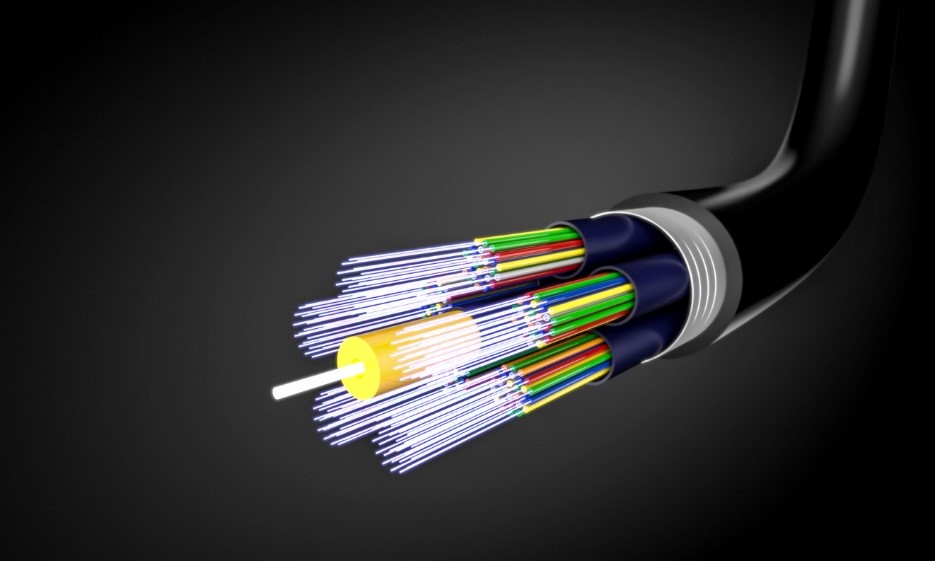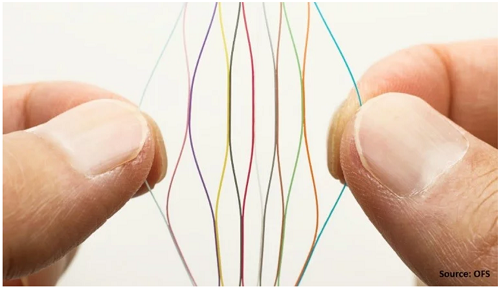(This blog post from Fluke Networks explores some of the testing techniques for fiber cable in data centers. Check it out! - Teddi)
While most enterprise data centers see fiber counts ranging from 12 to 144, the fibers counts found in cloud and colocation data centers are much higher – typically anywhere from 864 to 1728.

Most of us would consider these high-count fiber cables a very large trunk, but when it comes to hyperscale data centers with hundreds of thousands of servers and extreme workloads (think Amazon, Google, Microsoft and Facebook), it’s not unusual to see fiber counts of 3456 and 5184. And believe it or not, those numbers are growing. Several fiber cable manufacturers now offer 6912-fiber cables and 7776 fibers are on the horizon.
With that many fibers in one cable, the overall size of the cable and the time involved in testing is hard to imagine. And we’re not typically talking about a simple Tier 1 testing for insertion loss. High-count fibers coming into large data centers are singlemode ribbon fiber and Tier 2 testing with an OTDR is the norm.
Fitting it All
When fiber counts reach upwards of 3456, fiber cable manufacturers have had to get creative to keep cables at a manageable size. While outside plant fiber typically uses a 250-micron coating, many high-count fiber cable designs today use a 200-micron fiber to enable a more compact design. Keep in mind that the core and cladding size of the fiber hasn’t changed, so mass fusion splicing to 250 or 900-micron fiber is still the norm.

Some other new innovations we see in these high-count ribbon fiber cables include rollable or flexible ribbon fiber (sometimes referred to as “web”) that allow for nearly double the density compared to traditional outside plant ribbon cable.
Rather than a traditional flat design that bonds the 12 fibers in the ribbon along the entire length of the cable, rollable ribbon fibers partially bond individual fibers at predetermined points along the fiber, allowing the fiber to be rolled rather than lay flat. On average, this type of design allows for 3456 fibers to fit into a 2-inch duct compared to a flat design that can only accommodate 1728 in the same space. Rollable ribbon fibers are also lighter in weight, allowing for longer pulling distances and reduced labor costs.
Testing and Tracking it All
When it comes to testing a 6912-fiber cable, how quickly and efficiently your OTDR can perform a trace becomes more important than ever. Think about it; if one OTDR takes just 5 seconds longer to perform a trace compared to another, that equates to an extra almost 10 hours to test 6,912 fibers.
OTDRs like Fluke Network’ OptiFiber® Pro with a higher dynamic range and automated set-up and trace analysis offer much faster testing. With a higher dynamic range of 42 dB and automated trace analysis, OptiFiber Pro enables a two second trace per wavelength. It then analyzes the data and displays it as an EventMap, Table or Trace. And with automated setup, multiple wavelengths and parameters are automatically performed in a single test.
When it comes to Tier 2 OTDR testing, bidirectional testing and averaging of the results is required by industry standards and for most manufacturers’ warranty – and it adds testing time. Rather than moving the tester to the other end of a duplex fiber link for bidirectional testing, a loop is typically used at the remote end that allows both fibers to be tested in both directions from one end. The OptiFiber Pro features a built-in “SmartLoop” Assistant that checks for the presence of the launch, loop and tail fiber when testing, and it automatically averages the results to cut testing time even more.
While speeding test time is critical, keeping track of all 6,912 fibers during the process and managing the results may seem like a daunting task. But it doesn’t need to be. Fluke Networks’ cloud-based LinkWare Live is ideal for testing high-count fiber—not only can multiple testers be configured and programmed with cable IDs ahead of time to reduce errors and maintain consistency, but test data from multiple testers being used by multiple technicians can effortlessly be consolidated into a single project. And you can bet that when it comes to hyperscale data centers using high-count fiber cables, multiple technicians are testing. LinkWare Live also supports an unlimited number of projects and offers unlimited storage.
Click here to learn more about Fluke Networks.
Click here to contact your local Accu-Tech representative.


.png?width=58&height=58&name=X_logo_2023_(white).png)
